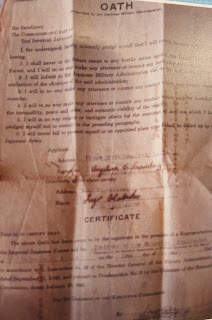Everybody was jumping. Some are crying. It was so nice. I even want to remember
it. I always try to remember when the Americans landed in a barrio before
Sibulan, Calo. It is a small coastal barrio with small huts. Fishermen live
there. The Americans landed there. I’m not sure how many, but they landed in
landing barges—two or three. When they open the landing barge, I remember very
well the American soldiers were all in camouflage uniforms. We were there by
the road with the mountains at our back. Juaning Dominado, the husband of Tita Gras is
the one who instructed the Americans whether to bomb because they were bombing
the mountains because it was the Japanese that were in the mountains now and
the guerrillas are down from the mountains already! So he instructs where—to
the left, to the right. So we were there beside him and we can see and hear. We
saw the Americans came wading in the sea.
I did not see any Japanese
anymore after that. After we left for the mountains, I never saw any Japanese
any more. When we were up in the mountains, the guerrillas were always
watching. They would ambush the Japanese that would come near. There is always
a small fight between the guerrillas and the Japanese, but I never saw them.
After they landed and we were
able to go back to the house, everyone came to the Big House. We had lots and
lots of American officers in the house because Tita Belen was very friendly. They
always made parties.
Angelina Trinidad Locsin, now 96, lives in Dumaguete City, Negros Oriental, The Philippines, with her two daughters, Maria Teresa and Maria Trinidad, and their husbands. Benjamin, who she married on March 1, 1944, died in 1997. So did her only son, Ramon Tomas, in July 2015. Angelina's four grandchildren, three sons-in-law and eight great grandchildren live in the Chicago, Illinois area.
Her incredible memory continues to amaze family and friends!
Angelina, July, 2012, looking through the letters Benjamin sent her while he was imprisoned by the Japanese
Angelina Trinidad Locsin, now 96, lives in Dumaguete City, Negros Oriental, The Philippines, with her two daughters, Maria Teresa and Maria Trinidad, and their husbands. Benjamin, who she married on March 1, 1944, died in 1997. So did her only son, Ramon Tomas, in July 2015. Angelina's four grandchildren, three sons-in-law and eight great grandchildren live in the Chicago, Illinois area.
Her incredible memory continues to amaze family and friends!



